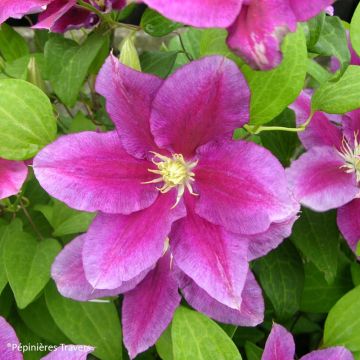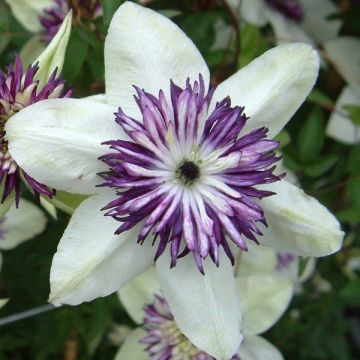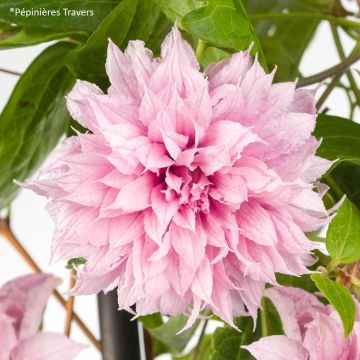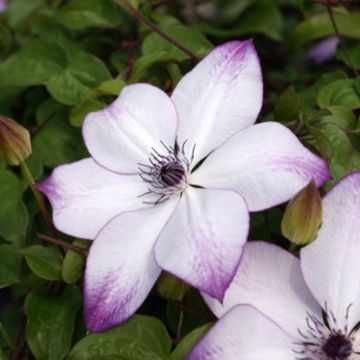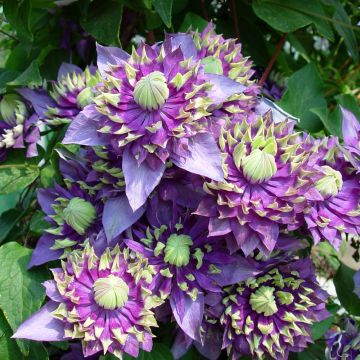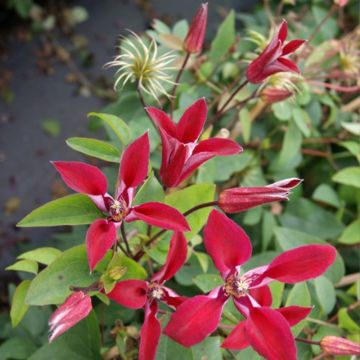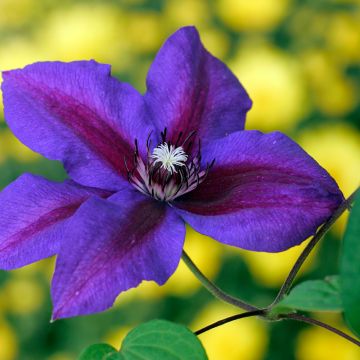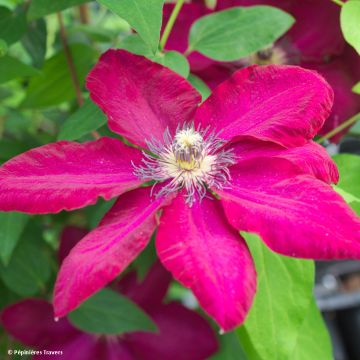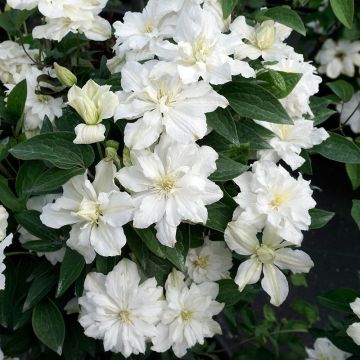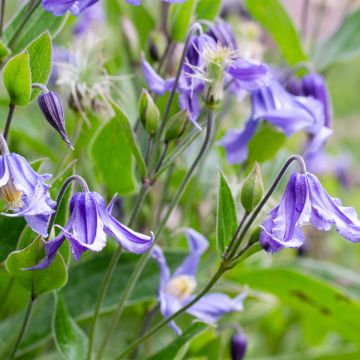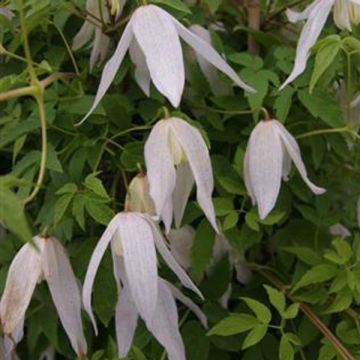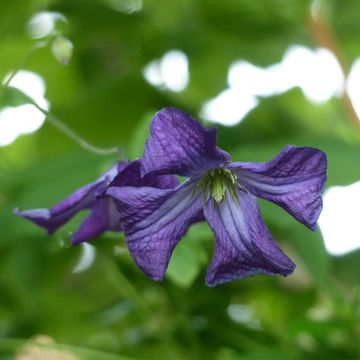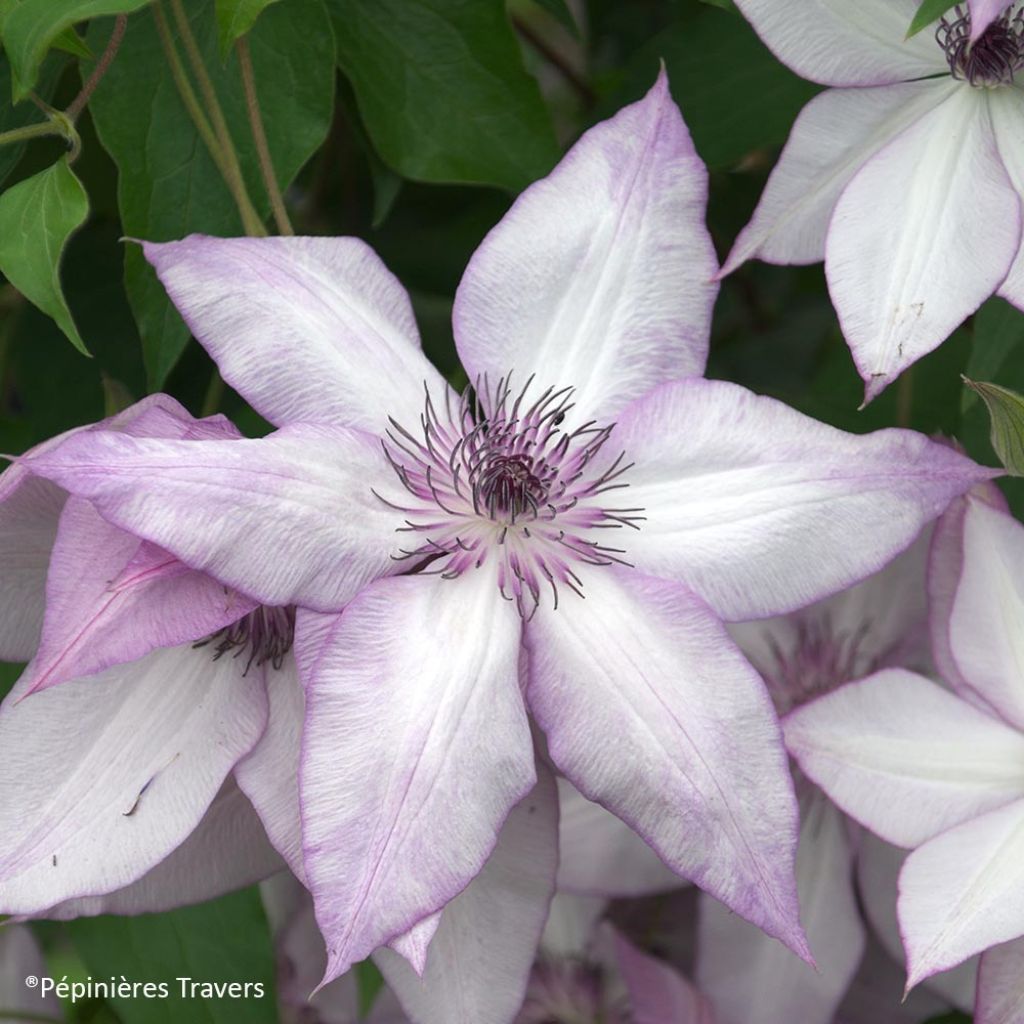

Clematis florida Utopia
Clematis florida Utopia
Clematis florida Utopia
This plant carries a 6 months recovery warranty
More information
We guarantee the quality of our plants for a full growing cycle, and will replace at our expense any plant that fails to recover under normal climatic and planting conditions.
From €5.90 for pickup delivery and €6.90 for home delivery
Express home delivery from €8.90.

Does this plant fit my garden?
Set up your Plantfit profile →
Description
Clematis florida 'Utopia' is a little-known variety resulting from Japanese hybridisations from C. florida. It is a more floriferous, more robust, and less demanding climber than its parent. It distinguishes itself from other hybrids with its large single flowers measuring 15 to 18cm (6 to 7in) in diameter. They are satin white with a pronounced pink-lilac rim that lightly tints the edges. They are beautifully punctuated with a heart of dark purple stamens that turn violet. This deciduous climbing clematis flowers in two waves: first in June-July and then in September-October. With a compact habit and medium size, it can be planted with shrubs in borders, grown on walls, trellises and pergolas, or even planted in pots or containers on a balcony or patio. It only dislikes stagnant humidity.
Clematis 'Utopia' is a Japanese cultivar from 2001 by Kozo Sugimoto. The hybrids of the C. florida group are recognised by their long petioles, and their single flowers with combinations of white, pale green, pink and purple colours with dark centres, which can be somewhat globose and adorned with decorative stamens. The clematis is a deciduous climber belonging to the Ranunculaceae family. Like most of its cousins, it prefers light, deep, moist, and fertile soil that is preferably neutral. It enjoys a sunny or partially shaded position, with its base always in shade. It resists cold temperatures and is not afraid of frost, even if prolonged. However, it does not tolerate stagnant humidity, so the substrate must be well-drained and watering should be moderate (if necessary, during the first year). It can be grown in a container if the pot is large enough (minimum 60cm (24in) in diameter.
This cultivar is a deciduous climber that can reach 2.5m (8ft) in height and 1.5m (5ft) in spread. It is a Group 3 clematis, meaning it is a late-flowering cultivar with large flowers that can bloom multiple times on the current year's herbaceous stems. Its flowers are composed of 6 oval, pointed tepals forming diamond shapes that overlap at their base. They bear a large heart filled with bristly stamens. Subsequently, they transform into persistent feathered achenes in winter, presenting a notable decorative feature. The deciduous and medium green leaves are composed of 3 to 5 leaflets. They are borne on voluble petioles called tendrils that curl around themselves onto their support.
Its colours are best displayed in partial shade. Plant spring bulbs and a few ground-cover perennials with white, pink or blue flowers at its base, and enjoy the spectacle with minimal maintenance. Perennials will drain the soil while keeping some necessary moisture for the clematis to develop. If you have a larger space, this vigorous clematis can weave through shrubs or up a column to bring verticality to a brightly coloured border. Large-flowered repeat-flowering clematis are also the best companions for roses. For a contrasting effect, let it climb on shrubs with purple or black foliage. Otherwise, combine it with another clematis with dark flowers.
Report an error about the product description
Clematis florida Utopia in pictures
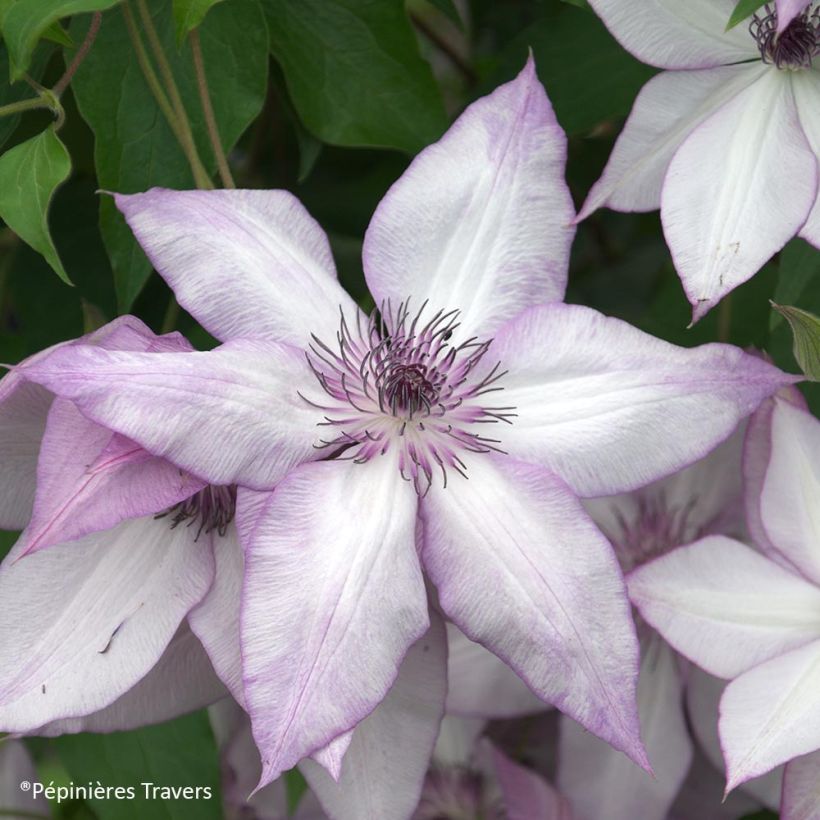

Plant habit
Flowering
Foliage
Botanical data
Clematis
florida
Utopia
Ranunculaceae
Cultivar or hybrid
Other Clematis Florida
Planting and care
Clematis plants like to have their base kept cool. If planted in a sunny position, shade the base of the clematis with a ground cover plant or a perennial geranium. Work the soil to a depth of 20cm (8in), enriched with good quality compost. Plant it by placing the rootball level with the ground (do not bury it) Water regularly and generously during the first few weeks. Do not overwater, as stagnant water can lead to the development of fungus at the base of the plant.
Clematis plants attach themselves using their tendrils. To promote their growth, provide them with a trellis or let them dress the trunk of a tree by placing a wire mesh against the trunk for the clematis to climb. Clematis plants also enjoy growing freely on neighbouring plants.
You can prune them quite vigorously (cut back to 50cm (20in)) at the end of winter in March.
Clematis florida are susceptible to mildew in a greenhouse with a humid atmosphere.
Planting period
Intended location
Care
-
, onOrder confirmed
Reply from on Promesse de fleurs
Clematis
Haven't found what you were looking for?
Hardiness is the lowest winter temperature a plant can endure without suffering serious damage or even dying. However, hardiness is affected by location (a sheltered area, such as a patio), protection (winter cover) and soil type (hardiness is improved by well-drained soil).

Photo Sharing Terms & Conditions
In order to encourage gardeners to interact and share their experiences, Promesse de fleurs offers various media enabling content to be uploaded onto its Site - in particular via the ‘Photo sharing’ module.
The User agrees to refrain from:
- Posting any content that is illegal, prejudicial, insulting, racist, inciteful to hatred, revisionist, contrary to public decency, that infringes on privacy or on the privacy rights of third parties, in particular the publicity rights of persons and goods, intellectual property rights, or the right to privacy.
- Submitting content on behalf of a third party;
- Impersonate the identity of a third party and/or publish any personal information about a third party;
In general, the User undertakes to refrain from any unethical behaviour.
All Content (in particular text, comments, files, images, photos, videos, creative works, etc.), which may be subject to property or intellectual property rights, image or other private rights, shall remain the property of the User, subject to the limited rights granted by the terms of the licence granted by Promesse de fleurs as stated below. Users are at liberty to publish or not to publish such Content on the Site, notably via the ‘Photo Sharing’ facility, and accept that this Content shall be made public and freely accessible, notably on the Internet.
Users further acknowledge, undertake to have ,and guarantee that they hold all necessary rights and permissions to publish such material on the Site, in particular with regard to the legislation in force pertaining to any privacy, property, intellectual property, image, or contractual rights, or rights of any other nature. By publishing such Content on the Site, Users acknowledge accepting full liability as publishers of the Content within the meaning of the law, and grant Promesse de fleurs, free of charge, an inclusive, worldwide licence for the said Content for the entire duration of its publication, including all reproduction, representation, up/downloading, displaying, performing, transmission, and storage rights.
Users also grant permission for their name to be linked to the Content and accept that this link may not always be made available.
By engaging in posting material, Users consent to their Content becoming automatically accessible on the Internet, in particular on other sites and/or blogs and/or web pages of the Promesse de fleurs site, including in particular social pages and the Promesse de fleurs catalogue.
Users may secure the removal of entrusted content free of charge by issuing a simple request via our contact form.
The flowering period indicated on our website applies to countries and regions located in USDA zone 8 (France, the United Kingdom, Ireland, the Netherlands, etc.)
It will vary according to where you live:
- In zones 9 to 10 (Italy, Spain, Greece, etc.), flowering will occur about 2 to 4 weeks earlier.
- In zones 6 to 7 (Germany, Poland, Slovenia, and lower mountainous regions), flowering will be delayed by 2 to 3 weeks.
- In zone 5 (Central Europe, Scandinavia), blooming will be delayed by 3 to 5 weeks.
In temperate climates, pruning of spring-flowering shrubs (forsythia, spireas, etc.) should be done just after flowering.
Pruning of summer-flowering shrubs (Indian Lilac, Perovskia, etc.) can be done in winter or spring.
In cold regions as well as with frost-sensitive plants, avoid pruning too early when severe frosts may still occur.
The planting period indicated on our website applies to countries and regions located in USDA zone 8 (France, United Kingdom, Ireland, Netherlands).
It will vary according to where you live:
- In Mediterranean zones (Marseille, Madrid, Milan, etc.), autumn and winter are the best planting periods.
- In continental zones (Strasbourg, Munich, Vienna, etc.), delay planting by 2 to 3 weeks in spring and bring it forward by 2 to 4 weeks in autumn.
- In mountainous regions (the Alps, Pyrenees, Carpathians, etc.), it is best to plant in late spring (May-June) or late summer (August-September).
The harvesting period indicated on our website applies to countries and regions in USDA zone 8 (France, England, Ireland, the Netherlands).
In colder areas (Scandinavia, Poland, Austria...) fruit and vegetable harvests are likely to be delayed by 3-4 weeks.
In warmer areas (Italy, Spain, Greece, etc.), harvesting will probably take place earlier, depending on weather conditions.
The sowing periods indicated on our website apply to countries and regions within USDA Zone 8 (France, UK, Ireland, Netherlands).
In colder areas (Scandinavia, Poland, Austria...), delay any outdoor sowing by 3-4 weeks, or sow under glass.
In warmer climes (Italy, Spain, Greece, etc.), bring outdoor sowing forward by a few weeks.

































